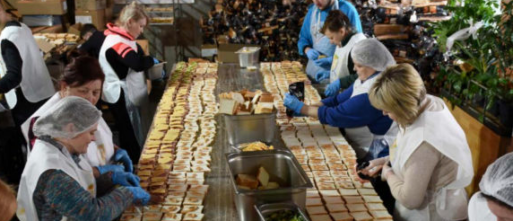What foodservice operators, big and small, do in the UK can have an impact on the battle against world hunger. A recent webinar by charity Action Against Hunger highlighted how every action can make a difference
Hunger is a problem facing people all around the world. Although conflict, as we have seen all too clearly in Ukraine, is one major driver, another major cause is climate change.
Action Against Hunger (AAH), an international charity committed to saving the lives of malnourished children and supporting their families and communities to beat hunger, held a webinar where two of its foodservice partners spoke about the way their businesses are working in a more sustainable manner to lessen their impact on the environment and raise funds to support the work of AAH.
The charity has been working with the food and hospitality industry for about 20 years to reduce emissions. “We’re blown away by how much companies are stepping up and wanting to affect change to make our planet a much better place,” says Hannah Sanders, AAH head of partnerships. “Thinking about how to deliver the sustainable development goals together, whether we can help you reduce your waste, how can we help you engage your employees for the benefit of our world. There are so many ways that we would love to collaborate with companies.”
Climate change is driving increasing floods and droughts, biodiversity loss and causing growing seasons to become shorter and fresh water to become scarcer. Anything more than a two degree rise in global temperatures could lead to 50% crop yield losses causing 700 million more people to be exposed to drought risk. Anything companies in developed countries can do to reduce emissions can help cut world hunger caused by climate change.
Corporate partner
KellyDeli was co-founded by Kelly Choi 12 years ago. It now has six brands – Sushi Daily, Korma Kitchen, Bam’bu, Kelly Loves, BamTuk and TukTuk – operated by 1,000 franchisees across 12 territories. “We set ambitious goals to align with sustainability strategy,” says Celine Ricord, corporate responsibility manager at KellyDeli. We aim to be net carbon zero by 2030 and cut food waste by 50% by 2025.We joined forces with AAH in 2020. The partnership is amazing in terms of employer engagement, supporting our core values.”
One member of the marketing team, Annabel Brimacombe, came up with an inspiring idea while learning to make sushi at a Sushi Daily training kiosk. “During process of learning to make the perfect sushi roll I noticed lots of the beautiful ingredients were being lost at each end as the roll was formed – lovely Scottish salmon, pickled veg, avocado. The chefs then chop of the ends of the sushi roll to make it look neat. Those trimmings end up in the bin and I thought I could make a beautiful salad for lunch from those trimmings,” she explains.
At first the team was concerned that the idea could damage Sushi Daily’s reputation for producing a restaurant-quality premium product. However, after topping with sauces and sesame seeds the little pots were put on sale as Forgotten Ends (see left) for an attractive price of £1.95, with 20p of that price going to Action Against Hunger’s Power of Nutrition program in Gujarat, India. To date £100,000 has been raised for the project, 133 tonnes of food and 333 tonnes of carbon have been saved.
“Customers seem to like it and our retail partners are delighted to see this initiative, and our founders are happy to see that we are aligning with their core values,” says Brimacombe.
Keeping it local
Working on a smaller, more local, scale is James Fowler. He is a restaurateur and award-winning bartender in Bournemouth, Dorset, UK and his restaurant Terroir Tapas has been awarded a Green Michelin Star. “Being as sustainable as we can is built into the way I operate as a restaurateur,” says Fowler. He has been working with AAH for about 10 years.
It started with me looking through the bins at what we threw away on a daily basis,” he says. “It was quite shocking. We worked with bartenders and chefs so one area’s waste could become a useable product for another, for example if a bartender used citrus peel in a cocktail, instead of discarding the rest of the fruit we gave it to the chefs to make marmalade.”
Terroir Tapas received a Green Michelin Star in 2022. It is built as eco-consciously as possible. A grey water collection system is used to flush the toilets for example. The restaurant does not accept any packaging from suppliers; it has its own delivery boxes that can be washed in the warewashing machines and reused. The only bins in the kitchen are composting bins. Apple pulp from a local cider maker is used to make vinegar and wonky veg and fruit is sourced locally to make stocks, preserves and ice cream for the menu.
“Reducing our climate impact is about thinking outside the box and doing things a little bit differently in your day-to-day processes,” says Fowler. “It’s rewarding for me and the team as many of the changes we have made save time, effort and money at the bottom line. We want to make sure our guests have an enjoyable experience with us without us having too much impact on the outside world.”
Jacquetta Picton







